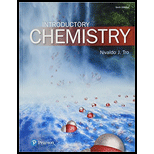
INTRODUCTORY CHEMISTRY-W/SEL.SOLN.MAN.
6th Edition
ISBN: 9780134845609
Author: Tro
Publisher: PEARSON
expand_more
expand_more
format_list_bulleted
Question
Chapter 17, Problem 14E
Interpretation Introduction
Interpretation:
On emission of gamma ray, the changes that occur in the atom are to be explained.
Concept introduction:
Gamma radiation is the most energetic form of
Expert Solution & Answer
Want to see the full answer?
Check out a sample textbook solution
Students have asked these similar questions
Don't use ai to answer I will report you answer
Consider a solution of 0.00304 moles of 4-nitrobenzoic acid (pKa = 3.442) dissolved in 25 mL water and titrated with 0.0991 M NaOH. Calculate the pH at the equivalence point
What is the name of the following compound?
SiMe3
Chapter 17 Solutions
INTRODUCTORY CHEMISTRY-W/SEL.SOLN.MAN.
Ch. 17 - Prob. 1SAQCh. 17 - Prob. 2SAQCh. 17 - Prob. 3SAQCh. 17 - Prob. 4SAQCh. 17 - Prob. 5SAQCh. 17 - Prob. 6SAQCh. 17 - Prob. 7SAQCh. 17 - Prob. 8SAQCh. 17 - Prob. 9SAQCh. 17 - Prob. 10SAQ
Ch. 17 - Prob. 1ECh. 17 - Prob. 2ECh. 17 - Prob. 3ECh. 17 - Prob. 4ECh. 17 - Prob. 5ECh. 17 - Prob. 6ECh. 17 - Prob. 7ECh. 17 - Prob. 8ECh. 17 - Prob. 9ECh. 17 - Prob. 10ECh. 17 - Prob. 11ECh. 17 - Prob. 12ECh. 17 - Prob. 13ECh. 17 - Prob. 14ECh. 17 - Prob. 15ECh. 17 - Prob. 16ECh. 17 - Prob. 17ECh. 17 - Prob. 18ECh. 17 - Prob. 19ECh. 17 - Prob. 20ECh. 17 - Prob. 21ECh. 17 - Prob. 22ECh. 17 - Prob. 23ECh. 17 - Prob. 24ECh. 17 - Prob. 25ECh. 17 - Prob. 26ECh. 17 - Prob. 27ECh. 17 - Prob. 28ECh. 17 - Prob. 29ECh. 17 - Prob. 30ECh. 17 - Prob. 31ECh. 17 - Prob. 32ECh. 17 - Prob. 33ECh. 17 - Prob. 34ECh. 17 - Prob. 35ECh. 17 - Prob. 36ECh. 17 - Prob. 37ECh. 17 - Prob. 38ECh. 17 - Prob. 39ECh. 17 - Prob. 40ECh. 17 - Prob. 41ECh. 17 - Prob. 42ECh. 17 - Prob. 43ECh. 17 - Prob. 44ECh. 17 - Prob. 45ECh. 17 - Prob. 46ECh. 17 - Prob. 47ECh. 17 - Prob. 48ECh. 17 - Prob. 49ECh. 17 - Prob. 50ECh. 17 - Draw the symbol for the isotope of lead that...Ch. 17 - Prob. 52ECh. 17 - Prob. 53ECh. 17 - Prob. 54ECh. 17 - Prob. 55ECh. 17 - Prob. 56ECh. 17 - Prob. 57ECh. 17 - Prob. 58ECh. 17 - Prob. 59ECh. 17 - Prob. 60ECh. 17 - Prob. 61ECh. 17 - Prob. 62ECh. 17 - Prob. 63ECh. 17 - Prob. 64ECh. 17 - Prob. 65ECh. 17 - Prob. 66ECh. 17 - Prob. 67ECh. 17 - Prob. 68ECh. 17 - Prob. 69ECh. 17 - Prob. 70ECh. 17 - Prob. 71ECh. 17 - Prob. 72ECh. 17 - Prob. 73ECh. 17 - Prob. 74ECh. 17 - Prob. 75ECh. 17 - Prob. 76ECh. 17 - Prob. 77ECh. 17 - Prob. 78ECh. 17 - Prob. 79ECh. 17 - Prob. 80ECh. 17 - Prob. 81ECh. 17 - Prob. 82ECh. 17 - Prob. 83ECh. 17 - Prob. 84ECh. 17 - Prob. 85ECh. 17 - Prob. 86ECh. 17 - Prob. 87ECh. 17 - Prob. 88ECh. 17 - Prob. 89ECh. 17 - Prob. 90ECh. 17 - Prob. 91ECh. 17 - 92. The fusion of deuterium and tritium produces J...Ch. 17 - Prob. 93ECh. 17 - Prob. 94ECh. 17 - Prob. 95ECh. 17 - Prob. 96ECh. 17 - Prob. 97ECh. 17 - Prob. 98ECh. 17 - Prob. 99ECh. 17 - Prob. 100ECh. 17 - Prob. 101ECh. 17 - Prob. 102ECh. 17 - Prob. 103QGWCh. 17 - Prob. 104QGWCh. 17 - Prob. 105QGWCh. 17 - Prob. 106QGWCh. 17 - Prob. 107DIA
Knowledge Booster
Similar questions
- K Draw the starting structure that would lead to the major product shown under the provided conditions. Drawing 1. NaNH2 2. PhCH2Br 4 57°F Sunny Q Searcharrow_forward7 Draw the starting alkyl bromide that would produce this alkyne under these conditions. F Drawing 1. NaNH2, A 2. H3O+ £ 4 Temps to rise Tomorrow Q Search H2arrow_forward7 Comment on the general features of the predicted (extremely simplified) ¹H- NMR spectrum of lycopene that is provided below. 00 6 57 PPM 3 2 1 0arrow_forward
arrow_back_ios
SEE MORE QUESTIONS
arrow_forward_ios
Recommended textbooks for you
- Chemistry: Matter and ChangeChemistryISBN:9780078746376Author:Dinah Zike, Laurel Dingrando, Nicholas Hainen, Cheryl WistromPublisher:Glencoe/McGraw-Hill School Pub Co
 Chemistry for Engineering StudentsChemistryISBN:9781337398909Author:Lawrence S. Brown, Tom HolmePublisher:Cengage Learning
Chemistry for Engineering StudentsChemistryISBN:9781337398909Author:Lawrence S. Brown, Tom HolmePublisher:Cengage Learning Chemistry: Principles and PracticeChemistryISBN:9780534420123Author:Daniel L. Reger, Scott R. Goode, David W. Ball, Edward MercerPublisher:Cengage Learning
Chemistry: Principles and PracticeChemistryISBN:9780534420123Author:Daniel L. Reger, Scott R. Goode, David W. Ball, Edward MercerPublisher:Cengage Learning  Chemistry for Today: General, Organic, and Bioche...ChemistryISBN:9781305960060Author:Spencer L. Seager, Michael R. Slabaugh, Maren S. HansenPublisher:Cengage Learning
Chemistry for Today: General, Organic, and Bioche...ChemistryISBN:9781305960060Author:Spencer L. Seager, Michael R. Slabaugh, Maren S. HansenPublisher:Cengage Learning General, Organic, and Biological ChemistryChemistryISBN:9781285853918Author:H. Stephen StokerPublisher:Cengage Learning
General, Organic, and Biological ChemistryChemistryISBN:9781285853918Author:H. Stephen StokerPublisher:Cengage Learning

Chemistry: Matter and Change
Chemistry
ISBN:9780078746376
Author:Dinah Zike, Laurel Dingrando, Nicholas Hainen, Cheryl Wistrom
Publisher:Glencoe/McGraw-Hill School Pub Co

Chemistry for Engineering Students
Chemistry
ISBN:9781337398909
Author:Lawrence S. Brown, Tom Holme
Publisher:Cengage Learning

Chemistry: Principles and Practice
Chemistry
ISBN:9780534420123
Author:Daniel L. Reger, Scott R. Goode, David W. Ball, Edward Mercer
Publisher:Cengage Learning


Chemistry for Today: General, Organic, and Bioche...
Chemistry
ISBN:9781305960060
Author:Spencer L. Seager, Michael R. Slabaugh, Maren S. Hansen
Publisher:Cengage Learning

General, Organic, and Biological Chemistry
Chemistry
ISBN:9781285853918
Author:H. Stephen Stoker
Publisher:Cengage Learning